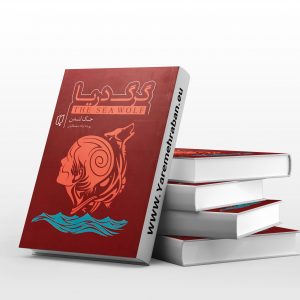Description
The book The Thoughts of a Clown by Heinrich Bell tells the story of Hans Schneier, a member of a wealthy family with a unique mindset. Hans left his father’s house because of differences in attitudes toward life and religion and worked as a clown.
Shanir, who seems to suffer from depression, headaches, laziness and monogamy, can only relax with one person and not with anyone or, better yet, no other woman. “Mary”; She is a very religious Catholic woman who, despite her guilt, lives with Hans for six years without marrying him.
According to the clown, marriage on paper is a delusion and religion, like other beliefs, is a personal matter that is not allowed to interfere with the privacy of individuals.
Hans adopts a belief other than the prevailing belief, and this causes him neither to accept society nor his society. In fact, the story of the book begins when “Marie” runs out of patience and leaves the clown without any agreement or conversation and formally marries someone else.
Hans, who according to the meaning and concept of marriage, with all being and something beyond being recorded on a piece of paper but a kind of heart commitment, accused “Marie” of betrayal and adultery, became depressed and, in the literary words, “complex” “It opens the heart” and in a way it hurts the reader.
In fact, in the book of the ideas of a clown, the hypocrisy and bitterness of the world are presented behind the face of a clown, and although it is classified as a love story, it has very deep critical and doctrinal themes.
The novel The Thoughts of a Clown is a real, sad drama that won the 1972 Nobel Prize in Literature and the 1967 Georg Buchner Prize. Following the publication of the novel in 1963, the critical nature of its content and its negative view of the Catholic Church and the liberal views of its German author, Heinrich Bُll, on religion and social issues, angered conservatives in Germany and sparked controversy. And there was a lot of controversy in the press.
The Ideas of a Clown is one of the most influential novels of the twentieth century, best known among the works of Heinrich Boll for its romantic theme, charming name, and nostalgic and emotional atmosphere.
He had a strong belief in shorthand and was considered by most German-speaking writers to be the most prominent German writer of the twentieth century. The conflict between post-war and post-war Germany, the subject of fascism and the church’s support for the affluent class, are among Bell’s main themes. The German Chancellor wrote a note on the anniversary of his death:
“Long live the memory of always helping the deprived … He was a militant and restless person who caused trouble for the government, but he was always respectable and his place will be vacant in our society forever.”
According to the latest polls in Germany among readers and critics, Heinrich Bell’s work is still popular, selling 35 million copies worldwide and being translated into 45 languages.
In Iran, too, because of his importance to man and the critical content of his works, on the one hand, and the issue of war and its consequences, on the other, his works have become particularly popular, so much so that Santouri made by Dariush Mehrjoui Is.
In a part of the book, the ideas of a clown read:
A clown who treats alcohol with pain, falls from the roof much faster than a drunken roofer.
When I enter the stage drunk, I make a lot of mistakes while performing the play, because I no longer have the care I need and that is why I get into trouble. I mean, I laugh at the behavior I show on stage, which is very disturbing and scary.
But as long as I’m awake, the excitement and stress before going on stage increases until the show (mostly I have to go on stage by force) and what some critics have called the “hidden vital joy in the heartbeat” for I was nothing but a frustrating cold that turned me into a puppet, and it was even scarier when the puppet’s thread was torn and I had to rely only on myself.
I feel like people like the monks who go deep into meditation while meditating have reached a similar state and gone through it as an experience.
Marie was always familiar with Sufi literature, and I well remember her repeating words like “empty” and “nothing” a lot.
I had not been conscious most of the time since three weeks ago, and I came on stage with a kind of false self-confidence. The result of this work was revealed to me much earlier than a lazy and easy-going student who is waiting for his transcript. Six months is a long time for daydreaming.
It has been three weeks now that there are no more flowers and pots in my room. In the middle of the second month, I went to the room without a bath, and at the beginning of the third month, they ordered me cheap drinks instead of cognac.
There was no show and instead they were meeting behind closed doors against me. Strange scenes with very little light were chosen for my performances.
The ideas of a clown written by Heinrich Bell should be considered one of the most enduring works of fiction in the history of German literature. Hitler, pays.
This German writer tells the lies and bitterness of the world from behind the face of a clown. The first character in Henrich Bell’s story is named Hans Schneier.
Hans belongs to a wealthy family, but due to differences in attitudes towards life and religion, he leaves the family and works as a circus clown. Marie is Hans’s partner who has lived with Hans for six years without marriage and with feelings of guilt.
But Marie leaves the clown forever to marry a Catholic and save herself from guilt. This hits the clown hard; His depression, melancholy, and constant headaches intensify, and the story continues with desperate clown gossip.
It should be noted that after the publication of this novel in 1963, the anger of conservatives in Germany was aroused by the author’s negative view of the Catholic Church. Nevertheless, the book in question should be considered as one of the most influential novels of the twentieth century.
About Henrich Bell
Heinrich Bell was born on December 21, 1917 in Cologne, Germany. At the age of twenty, after graduating, he worked in a bookstore, but the following year, at the same time as World War II began, he was called up for military service and served on the battlefield until 1945.
He was initially associated with the Nazis; But over time, his views changed and he realized the depth of the tragedy of war and crime of the Nazi regime. Heinrich was wounded several times during the war, escaped from the barracks, and forged pass cards to the west, where he was captured by the Americans.
He published his first short stories in 1947, the release of The Train Story came in time, and in 1949 brought him fame.
In 1972, Heinrich Bell became the second German to win the Nobel Prize for Literature. The protagonists of his stories are often helpless and broken, but Bell does not consider them broken; In fact, this author is someone who adheres to moral principles to the end.
Henrich died in July 1985 and his body was buried near his birthplace.
Sentences from the book of ideas of a clown
A clown who treats alcohol with pain, falls from the roof much faster than a drunken roofer.
When I enter the stage drunk, I make a lot of mistakes while performing the play, because I no longer have the care I need and that is why I get into trouble. I mean, I laugh at the behavior I show on stage, which is very disturbing and scary.
But as long as I’m awake, the excitement and stress before going on stage increases until the show (mostly I have to go on stage by force) and what some critics have called the “hidden vital joy in the heartbeat” for I was nothing but a frustrating cold that turned me into a puppet, and it was even scarier when the puppet’s thread was torn and I had to rely only on myself.
I feel like people like the monks who go deep into meditation while meditating have reached a similar state and gone through it as an experience.
Henrich Bell, the creator of the ideas of a clown
Henrich Bell; It is the name of an author who has portrayed the bitter and disappointing moments of this lone clown. In most of his works, the German author narrates the moments and fringes of World War II, and the reason is that he spent his military service in World War II.
The story of a clown’s beliefs is no exception; Because if we look at the story a little more closely, we will find that the author has cleverly written about a society influenced by Hitler after World War II; However, Bell’s main purpose in writing this novel is to critique the Catholic community! according to this; In all parts of the book, the author tries to sharply criticize the incomprehensible laws and customs of Catholics.
The Ideas of a Clown is one of Bell’s most important and popular books; Because this noisy book all over the world is stuck in the heart of clowns who do not have ideas that are compatible with their society.
Analyze the ideas of a clown
Henrich Bell is a writer who narrates wounded and poor characters in most of his works, and the only reason is that he likes simple and capable people in his life, and the protagonist of his stories has always portrayed hard people. has it.
Most audiences and fans of the clown’s beliefs believe that they have not encountered an amazing and new story by reading this book; Because the story is fascinated only by the pen and art of Henrich Bell. The author has painted the simplest images in the best and most attractive way. Thus, the secret of Bell’s success in his attractive and unique illustration can be considered.
Another point that has been discussed about this work by Heinrich Bell is that the author lengthens the story by describing the margins, and this is beyond the boredom of many audiences. Maybe if these margins were less, it could make the story more attractive to the audience.
Writing on the back cover of the book
“You did your best to console yourself with the left-wing insolence of the ‘money man’, and what a waste. You did your best to be angry with Bluet’s vulgar right-wing philosophy! “Yes, no; think of nothing. Not the Chancellor, not the Catholics. Think of a clown who sheds tears in the bathroom and drops of coffee on his slippers.”
Part of the text of a clown’s book of ideas
The story begins when a man named “Hans Schiner”, who works as a famous and popular clown in Bochum, Germany, has an accident on the stage of his last performance for a charity and his knee is injured. .
This accident causes the play to collapse, and in the end, the play’s director not only does not pay Hans, but also attacks Hans’s artistic reputation by publishing a story about a clown who messed up the play with his clumsiness. This busy clown will be unemployed and his future jobs will be canceled.
Another part of the story tells the story of Hans’s personal life with his beloved wife, Marie. Marie leaves Hans for religious reasons and sectarian differences between Catholics and falls in love with a Catholic man, which makes Hans more depressed than before and creates melancholy for him.
After Marie leaves, Hans becomes very addicted to alcohol and finds himself in a miserable situation in life. In one part of the story, Hans says after drinking alcohol: There are two things in my life that are relaxing, one is marijuana and the other is alcohol. The effect of alcohol is temporary, but Marie could be my sedative forever, which is no more!
Hans is going through very difficult days after Marie leaves and becomes unemployed. Because he does not have a single coin left! Hans calls for help from all his friends and acquaintances, but no one is willing to help him or even lend him money.
Hans R. miserably gathers his belongings to return to his hometown of Ben, and essentially tells the story of all these hours before leaving for Ben. Finally, the poor clown with a guitar and a pillow brings himself to the train station and makes up his face with old powder and oil. The clown pockets his hand and encounters the two cigarettes left for him.
He smokes a cigarette and puts the second cigarette in his hat on the floor so that people understand that he needs a cigarette in addition to money.
The story ends with Hans singing and playing until a passerby throws a coin in Hans’s hat and the clown with his anti-Catholic beliefs still continues to sing and play. Throughout the story, the audience reads scattered memories of the life of this poor clown to find out how he got to this point.
Selected sentences of a clown’s ideas, the best dialogues in the book
Throughout the story, the audience encounters compelling sentences that he likes to write in the corner of his notebook and read over and over again. These sentences feed the juice of the story to the audience.
There is only one temporary treatment and that is alcohol. And there can be a definitive and permanent cure, and that is snake. Marie has left me and will not return. Even now, a clown who eats can fall sooner than a drunken roofer.
– An artist is like a woman who knows nothing but love and is fooled by every male donkey in the alley! Women and artists suffer more than any other creature!
– When I want to cook something for myself in the kitchen. I feel lost. My hands weaken from being too lonely, and the need to open a can or break an egg in a pan leads to deep melancholy. I can not be angry.
– A woman is able to say many things with her hands or pretend to do something with them. While when I think of a man’s hands. They look like a stump, dry tree. Men’s hands are only used to shake hands, beat or shoot and pull the trigger and sign.
But women’s hands should be looked at differently than men’s; When rubbing butter on bread and when removing hair from the forehead.
– He tried to say, life is going on, but I knew it was no longer life going on, but death going on.
– The main purpose of comedy is to present to people in the form of an abstract aspect that comes from the heart of their real life.
– An artist is like someone who only knows how to love and he gives this love to everyone and Naxie.
– I have decided not to talk to anyone about money and art anymore. When these two categories collide, one of them gets into trouble. Art does not always get what it deserves. Or he gets more than that.
1- Introducing the book on YouTube
2- Introducing the book in Aparat














Reviews
There are no reviews yet.